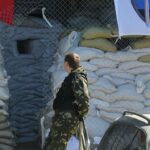Answering the question of how far the United States will let Israel go in challenging Turkey’s project in Syria is anything but simple. The complication lies in the fact that, at a minimum, this Turkish project received early American consent, and at its most expansive, Washington possess a dominant influence over the Turkish operations unfolding in Syria. Between those two poles, any attempt at fine-tuning would likely reveal only marginal differences in degree, not direction.
The real dilemma is that the scene now involves three key partners, and at this foundational stage, it is vulnerable to serious disruptions that could throw off the calculations of all parties involved. One player in particular—Israel—poses the greatest risk of going off-script, which could leave the other partners grappling with complex and difficult questions.
Turkish Foreign Minister Hakan Fidan, the chief architect of Ankara’s Syrian venture, described Israel’s recent large-scale airstrikes in Syria as a threat to regional security. He asserted that they violate the territorial integrity and national unity of countries like Syria and Lebanon. In a pointed remark, he questioned why Israel is so alarmed by developments in Syria and Lebanon that, in his view, offer real hope for stability. He called on Israel to stop undermining efforts to establish stability in Syria, stressing that the recent Israeli strikes cannot be understood in isolation from a broader approach that thrives on perpetual conflict.
Part of Fidan’s message was clearly aimed at the United States—a veiled reminder that “this was not part of the agreement,” at least from his perspective. On the other side of the equation stands the Israeli view, which was recently articulated by Defense Minister Israel Katz. In a warning addressed to Syria’s president—whom Katz pointedly referred to by his earlier nom de guerre, “al-Jolani”—he cautioned that Syria would pay a heavy price if it allowed “hostile forces” threatening Israel’s security interests to enter or operate on its territory in any form.
There is little doubt that the language used by both men—deliberate and precise—reveals their countries’ stances and their red lines regarding the evolving situation in Syria. A recent leak exposed an agreement between Damascus and Ankara, now in Israel hands, granting Turkey both influence and military footholds on Syrian territory. The Israeli military views this arrangement as a constraint on its freedom of movement and operational reach in Syrian airspace. In response, Israel launched a series of airstrikes, targeting two airbases and key military infrastructure in Damascus, Hama, and Homs—this time striking not at the periphery, but at the core of the Syrian state. The strikes also extended to the vicinity of the Scientific Research Center in the Barzeh neighborhood of Damascus, alongside concentrated aerial attacks on areas surrounding Hama.
This area represents the strategic core of Syria’s military infrastructure, and it appears to have been the focal point of an agreement between Damascus and Ankara, allowing the Turkish military to use this base as a primary foothold. This would enable Turkey to control the area surrounding Damascus and its northern countryside, while maintaining a commanding view of Syria’s northern provinces—an area Ankara, in coordination with the United States, aims to clear of long-standing militias and armed factions once backed by Turkey, replacing them with a formal, organized military presence under direct Turkish command. This Turkish approach mirrors the al-Watiya Air Base model in Libya. There was a Turkish plan for this base to serve, in practice, as the nucleus for establishing a future Syrian army aligned with the new state.
Up to this point, it appears that the United States tacitly approved the Turkish arrangements. However, Israel seems to have obtained intelligence indicating that the Turkish model involves deploying air defense systems and drone squadrons at the base—moves it viewed as a breach of earlier understandings designed to preserve a delicate balance: Turkish presence in northern and central Syria, and Israeli presence in the south and southeast, with neither side gaining a strategic edge that might constrain the other’s operations.
This explains Katz’s remark regarding an agreement between Damascus and Ankara that grants Turkey military bases and influence in Syria—potentially restricting Israel’s operations and freedom of movement in Syrian airspace. It also sheds light on why the Israeli airstrikes were accompanied by an unexpected ground incursion into Daraa province, marking the first time Israeli forces entered that territory.
Israel’s ground incursion into Daraa is no less consequential than its airstrikes on Damascus and Hama. Israeli army units pushed into new territory with the apparent aim of annexing it to areas secured in recent months. The units penetrated western Daraa before withdrawing to newly established positions within Syria, while Israeli reconnaissance aircraft conducted heavy overflights over Quneitra and western Daraa. This clearly signals an accelerated pace in Israel’s ongoing strategy of territorial encroachment. At the same time, it sends a message to Turkey: its operations in southern Syria remain incomplete, and Israel’s moves—geographically proximate—could disrupt or complicate Ankara’s plans in the region.
A difficult and complex test faces the new Syrian administration—one too intricate for it to navigate unilaterally. As such, the burden falls on the “project’s” key third partner—the United States—to step in and recalibrate the fragile balance of power, which remains vulnerable to disruption at any moment.












